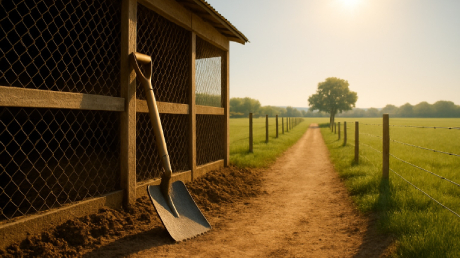
From Turkey Pens to Turnarounds: What I Learned About Leadership by Picking Up the Shovel
At 13 years old, I got my first job working on a turkey farm. It wasn’t glamorous. My primary responsibility, alongside the farmer’s son, was to clean out the turkey pens after the birds had moved on to their next phase of growth. These structures were filled with what you’d expect—weeks of accumulation from hundreds of birds. The job was hot, smelly, and exhausting. But it had to be done. The space needed to be cleared and reset for the next flock. Growth couldn’t happen in a compromised environment.
That was my introduction to leadership—though I didn’t know it at the time. I was handed a shovel, and the task was clear: do the work no one else wanted to, so something else could thrive. That lesson has stayed with me throughout my career.
Years later, in executive roles across startups, turnarounds, and growth-stage companies, I’ve often found myself in similar situations. The problems were different—strategic confusion, broken processes, toxic culture, unclear execution—but the work felt familiar. The shovel may have changed forms, but the job was the same: clear out what’s holding the business back so it can move forward.
Importantly, these weren’t the result of negligence. They were areas that inevitably needed attention. Internal and external pressures had forced compromises in how decisions were made, how people were managed, or how priorities were set. Over time, those compromises compounded. Just like the turkey pens, if left unaddressed, they created a drag on progress.
Every company wants growth. But few account for the cleanup it requires. Leaders want to design the future, but they don’t always want to pick up the shovel and deal with what’s in the way. That’s where the real work lies. You can’t build on a weak foundation.
There’s a culture piece, too. Back on the farm, we never asked why the pens were dirty. It was obvious—that was just part of the process. The only question was when and how we were going to clean them. I’ve tried to build that same pragmatism into the teams I’ve led. Problems aren’t necessarily a failure—they’re often just a sign that things are moving fast, and compromises were made in service of momentum. That’s okay. But they still need to be dealt with. And the best cultures don’t punish the mess—they support those who step up to fix it.
Cleanup work isn’t glamorous. It rarely earns praise or headlines. But it’s foundational. And the leaders I’ve respected most weren’t just visionaries—they were the ones who picked up the shovel when it mattered. They didn’t delegate the hard stuff. They didn’t avoid the ugly truth. They stepped in, cleared the path, and let others move forward with confidence.
In today’s business culture, we sometimes forget this. We celebrate transformation and disruption, but ignore the messy middle. There’s too much talk of bold vision and not enough emphasis on operational readiness. You can’t scale on top of a mess. Someone has to do the work. Someone has to grab the shovel.
Leadership isn’t about staying clean—it’s about knowing when it’s time to dig in.
Just like on the turkey farm.





